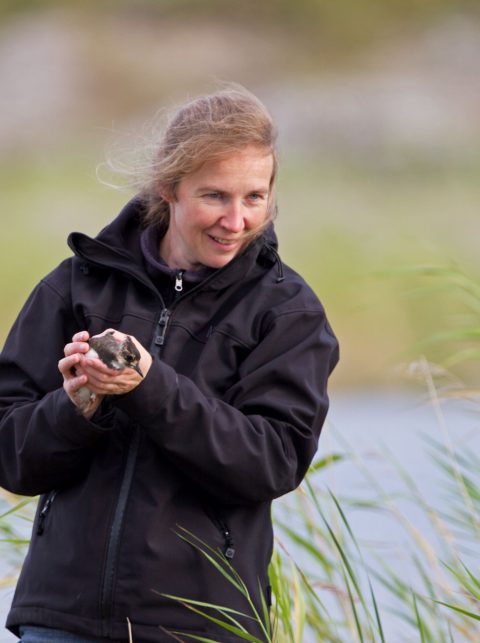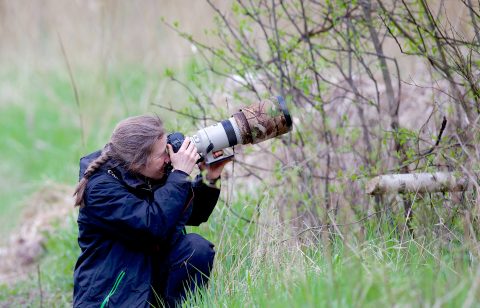Prof. Zita Rasuole Gasiunaite is the head and lead scientist of the laboratory of Marine Ecosystems of Open Access Centre for Marine Research and a professor at the Department of Natural Sciences of Klaipeda University in Lithuania. At the same time she is a professional wildlife photographer and amateur rider.

Prof. Zita Rasuole Gasiunaite. Photo: Saulius Gulbinskas
What inspired you to pursue a career in marine sciences?
I have been interested in everything related to natural sciences since as far back as secondary school, and I realised quite early that I wanted to study biology. In the years of studies, it happened so that the first research topic was related to water ecology: I worked with lake plankton. My future scientific adviser had written next to the topic that they would prefer a guy, therefore, at the beginning of our joint work, he was slightly disappointed; during the field practices he would think of all kinds of funny “male” stamina and strength tests (like rowing a boat, climbing over fences, carrying stones, etc). As time went on, his condescending attitude toward women in science changed radically, and we have been very good colleagues since then, regularly working together on joint projects. When he remembers his youthful prejudices, he never misses a chance to make fun of himself.
The first encounter with marine sciences took place in the years of studies, when I first took part in an expedition in the Curonian Lagoon. Although the expedition failed due to a storm, my first sailing on stormy waters did not frighten me.
In the years of studies, I never considered a career of marine biologist; in fact, such ideas were not likely to occur to one studying 300 km away from the sea, and especially because students were never offered any sea-related research topics. Marine research came to my life accidentally, when upon graduation from my university studies I was offered a job in a newly established Klaipėda University. Thus the further fields of scientific research were predetermined by the geographical location of my workplace.
I came to work in Klaipėda not because of the sea, but because the team there was young, open, ambitious, and focused on innovations and Western research quality. I was attracted by the absence of hierarchy, typical of teams with old traditions: all of us were just colleagues, and we were growing together, creating traditions, and learning from our own mistakes. There was a lot of youthful maximalism and there was nobody to tell us our ideas were stupid and uninteresting. On the one hand, it seemed risky, on the other hand, it was a guarantee of success.
I have started my career from the lowest position as a laboratory assistant and went through all the “mandatory” scientist evolution stages, from collecting field material and working on it in the lab to the formulation of new research fields or topics. I was lucky to have a scientific supervisor of my PhD dissertation who never tried to squeeze me into a frame, who was open for discussions and new ideas, did not destroy my initiatives, and allowed me to make my own decisions. It was a great school of autonomy.
What are the main things you enjoy about being a marine scientist?
As a marine biologist, I enjoy not so much the marine science itself, which undoubtedly is very interesting, but rather the academic environment that provides a freedom for comprehensive activity, creation, and growth in every sense. In fact, I am not even a true marine researcher, as I work on a variety of ecosystems, both marine, freshwater, and land; moreover, I combine research and administrative duties. The versatility may be harmful to the depth of the knowledge, however, it allows a broader glimpse into very different fields and facilitates finding solutions to non-standard situations.
Do you think there is a need for special girls’ support to study marine sciences?
What do I think of special support to girls who are interested in the studies of, or careers in marine sciences? Should I have been offered specific gender-related assistance at the beginning of my career, my reaction would have been very negative: I would have seen it as a manifestation of sexism. Apparently, that’s because in the working environment I see people as individuals with certain abilities, competences, and potential, but not as representatives of one or another gender. I have never had any gender-related problems throughout my career; I encountered more difficulties because of my personal traits and characteristics.
In my opinion, too great attention to gender issues can provoke quite opposite reactions, to oppose sexes, etc. As proved by practice, science-oriented women are perfectly able to concentrate on their goals in difficult period of their lives (childcare or other things), to efficiently plan their time, and to achieve excellent results. I would even say that they act more efficiently than those who do not face all those family-related challenges.
Of course, there are different situations, and it would be good to respond to them in a flexible way. However, assistance should be very individualised. We observe quite a lot of different examples around us and I am not sure that it is women who need some exceptional assistance. More than that, I believe that in the present day situation men are more discriminated, as the expectations towards them are frequently exaggerated.
What advice would you give any women considering science as a career path?
I am sure that each person, whether a man or a woman, should find their own way, since there is no universal gender-specific patterns.
I cannot think of any gender-related specificity, each one has to find their own ways. Science, like any other creative activity, needs a free and original personality, and any attempt to squeeze them into a frame or a pattern will bring nothing good. The main thing is not to interfere in individuals’ efforts to find their own place.
If a woman is considering a research career, I would advise her to try so that not to regret later. One can leave science at any time, and the experience acquired in an academic environment is invaluable.

Prof. Zita Rasuole Gasiunaite. Photo: Gediminas Grazulevicius
What are the most effective way for you to maintain balance in your life?
Of course, it is good to maintain a balance between work and personal life. For me it means a diversity of activities and topics, from water to land and from research to administrative activities, in the workplace, and the fields of interest, totally unrelated to science or related in some unusual way, sports, and the opportunities to radically change the environment every day outside the workplace.
What are your professional and personal dreams?
As for the future and professional or personal dreams, I believe dreams belong to childhood or adolescence; now I make my follies come true immediately, without cherishing them in the stage of a dream. The dream ties you down, prevents from seeing the diversity and the opportunities and from a flexible response to the situation. My greatest dream is to enjoy a fun and interesting life both in the professional and personal fields. To be satisfied with the process and the results. Especially – with the process.
Thanks to Zita for sharing her insights!
What a shame, this story is real resistance against BalticGender project idea …
Any transdisciplinary between marine and social sciences, pity…
This blog post presents the thoughts of a female scientist on careers in marine research. It focusses on the need to value individuals in academia and NOT segregate people into different groups. Ideally this is how academia should be working, but research has shown that unconscious biases, in both women and men (e.g. Moss-Racusin et al. 2012), towards women in science might hinder women as a group in the academic career. Baltic Gender aims at increasing the awareness about gender equality, including the existence of unconscious bias in both men and women, and at changing structures within the marine organizations, for example through the implementation or improvement of Gender Equality Plans.